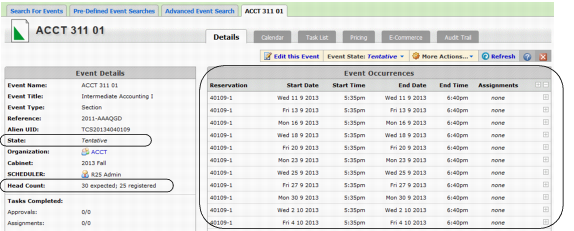Event with required information used by the Optimizer circled

This event data... | Is used by the Optimizer to... |
Event reservation (at least one required) | Identify the event’s date/time, meeting pattern, and assigned location (if pre-assigned). |
Primary organization (optional, but highly recommended; see Events without a primary organization have a lower priority) | Identify the event’s sponsoring organization, and the partition preferences of that organization. |
Head Count (required) | Identify the event’s expected or registered head count. |
Binding space assignment relationships (optional) | Identify other events that require the same location assignment and to designate which is the primary event. |
Event name (optional) | Identify the name of the event. Note: The Optimizer uses a unique internally-generated Event Key, not the event name, to identify the event. |
Event title (optional) | Identify the title of the event. |
Feature preferences (optional) | Identify the location features the event requires. |
First choice space preference (optional) | Identify the location preferred by the event. |

Events without a primary organization have a lower priority The Optimizer gives events without a primary organization a significantly lower priority than events that have a primary organization. Events with no primary organization can be thought of as having a “fifth partition preference” (a lower priority than the up to four partition preferences each organizations can have) that includes all locations in all partitions. See Organization partition preferences. |